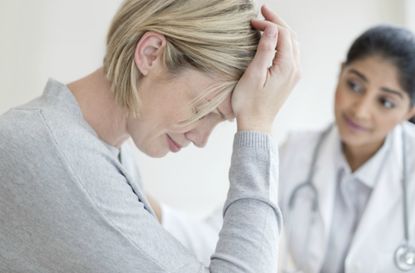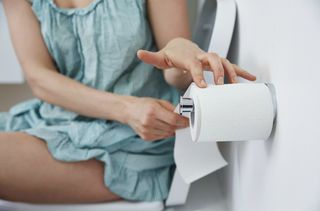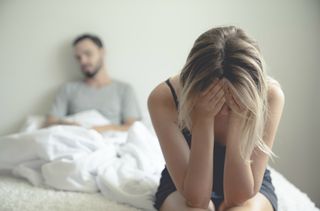The 7 embarrassing symptoms women DEFINITELY shouldn't ignore
Feeling shy about certain symptoms and talking about them is only natural, but what if your avoidance could lead to a major health issue?

There’s nothing worse than realising you’re just going to have to bite the bullet and talk to your GP about a particularly embarrassing symptoms, let alone pulling yourself together and actually doing it. We’re British, after all!
But what if your avoidance is doing you more harm than good? According to a recent survey, there's a word us women could be avoiding so much so, that we're putting our health in danger by not going to the doctor for a chat about it!
A study conducted by Ovarian Cancer Action found that two thirds of women between the ages of 18-24 are too embarrassed to say the word 'vagina' to a doctor, compared with just 11 per cent of women aged 55 to 64. Alarming when you consider that around 7,100 women are diagnosed with ovarian cancer each year.
Professor Christina Fotopoulou, consultant gynaecological oncologist at Queen Charlotte's & Chelsea Hospital, confirmed how vital it is for women to be able to talk to a GP about their embarrassing symptoms. 'It is important that women don't feel embarrassed to go to the doctor and get treatment if necessary. We can save these women when the disease is caught early.'
Not being able to utter 'vagina' to a healthcare professional isn't the only thing we're guilty of avoiding. It's far too easy to pass embarrassing symptoms off as unimportant and no big deal, particularly when they're high on the cringe scale. 'Oh I'm sure it'll stop soon.' 'A quick Google and I probably don't have any of those scary-sounding issues do I?'
Health website Healthista's GP Dr Deyo Famuboni has explained exactly why you need to get over your fears, and the seven embarrassing symptoms you need to get down to the doctor for.
And remember, if you're not appearing on Embarrassing Bodies as their latest guest then your embarrassing symptoms really can't be that bad at all!
GoodtoKnow Newsletter
Parenting advice, hot topics, best buys and family finance tips delivered straight to your inbox.
1. Fishy smelling discharge
If 'down there' is smelling a little 'fishy', it could be because of an overgrowth in bacteria caused when the natural environment of the vagina becomes upset, known as Bacterial Vaginosis - a common condition found in one in three women. This is different from a yeast infection, which can be itchy with an odourless discharge.
Gynaecologist Anne Henderson: 'Bacterial vaginosis (BV) is caused by gardnerella which is a specific bacteria, it can be sexually transmitted but it can also be related to an upset in the general imbalance in the vagina. The condition causes a very runny, watery discharge, fishy odour, doesn't cause as much discomfort as thrush.
'A change in discharge combined with a fishy odour could likely be Bacterial Vaginosis. However, unlike thrush, BV, won’t cause discomfort. If you suspect you have BV, you should be able to treat the symptoms quickly within a week with a pH balancing gel, such as Canesbalance BV gel. Products such as Canesbalance will help the body to naturally restore its pH and reduce bacterial growth and symptoms within 7 days.'
Usually, bacterial vaginosis doesn’t cause further problems, but if it occurs at certain times, such as during pregnancy, it may increase the risk of early delivery.

2. Painful bowel movements
Painful bowel movements is often due to haemorrhoids or fissures around the back passage, and straining due to constipation can make this worse - causing trauma to the surrounding area. If this happens the pain can make you less inclined to pass stools, so it's important to have this treated to prevent serious constipation, profuse bleeding and infection in that area.
Eating more fibre-rich foods, getting some exercise and drinking plenty of water should all help reduce painful bowel movements. You can also buy laxatives, topical ointments and suppositories from a pharmacy or have them prescribed from the doctor. Bleeding or lower abdominal discomfort or pain are also both symptoms of bowel cancer, so if you're worried visit your GP.
3. Excessive sweating
It's hard to believe, but according to the NHS most people sweat about a litre a day, and around 3 in 100 produce ten times as much sweat each day. There are various reasons why sweating can become excessive, but sweating continuously, regardless of how active or stressed you are, usually means the sweat glands are constantly activated. This is a condition called hyperhidrosis.
The cause of this can range from infections to hormone problems and idiopathic, so finding and treating excessive sweating is crucial. Sometimes excessive sweating can be reduced with topical preparations available on prescription if antiperspirant isn't working. A referral to a dermatologist may be required as other treatment options such as ionotophoresis (the use of water currents to stop sweating), oral medications or botox are available.
4. Bloated stomach
Bloating caused by eating foods and drinks that cause excess wind, can also be the result of other factors. If your bloated stomach is associated with other symptoms, such as urine or bowel frequency, or abdominal pain, then take a trip to your doctor who might test for problems such as coeliac disease (an intolerance to gluten affecting one in 100 people) or fibroids (a common condition affecting up to 40& of women that isn't harmful, but may require surgery).
5. Nipple changes
If your nipples are leaking, inverted or the skin around the nipple area has changed, there could be several causes, including problems with your hormones. If you aren't breastfeeding but producing breast milk, this should be investigated as you may have too much of the hormone prolactin.
Other causes include medications, stress, thyroid and kidney problems, which are all treatable. However, if left untreated it can affect your periods, cause infertility, and even contribute to osteoporosis.

6. Low libido
This one's a little more complex, as the cause could be physical, psychological or social. Women can experience low libido due to hormone changes, yet mental health problems, such as depression, are also a common cause. Depression affects the chemicals in your brain which are required for a normal libido such as serotonin. There may be other symptoms of depression such as trouble sleeping, general aches, as well as feeling sad and hopeless.
Speaking to a healthcare professional can help work out whether your symptoms are due to depression or stress and also signpost you to the best treatment option for you, such as talking therapy, mindfulness or exercise therapy. If you think you might be depressed and you don't want to go to your doctor then visit the Mind website for more help and information.
7. Incontinence
Incontinence affects a staggering 1 in 3 women, yet it's something we talk very little about due to the stigma attached to bladder sensitivity. Women often find they leak urine when exercising, especially running, or when they cough, sneeze, lift something heavy or laugh, known as stress urinary incontinence, and can be due to the increase in abdominal pressure with exercise or because of an overactive bladder. The latter is known as urge incontinence.
As well as exercise, some medications, weak pelvic muscles and urine infections can also cause incontinence. Treatment options vary, but it's important to see your doctor to rule out any structural abnormalities, test your urine and direct you in the treatment path that would be more suited to your symptoms.
-
 Worried about your teen 'being smelly'? They can't help it, according to scientists, and help is on its way to ease the problem
Worried about your teen 'being smelly'? They can't help it, according to scientists, and help is on its way to ease the problemWe know that puberty can cause all sorts of smells to emanate from teens - now scientists have revealed exactly what you're smelling, and how evolution contributed.
By Lucy Wigley Published
-
 Parenting coach shares 4 'powerful' reframes to try next time it feels like your kid is pushing all your buttons (and #4 is a game changer)
Parenting coach shares 4 'powerful' reframes to try next time it feels like your kid is pushing all your buttons (and #4 is a game changer)A parenting coach has shared four ways parents can reframe their thoughts when their kid has big emotions. Giving them a try could offer big results in little time.
By Lucy Wigley Published